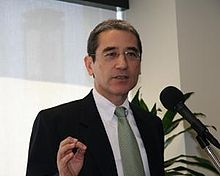 Vào 15 tháng Tư này, Thủ tướng Trung Cộng viếng thăm hai trường đại học Thanh Hoa và Bắc Kinh. Thế là giới sinh viên giáo sư của thủ đô bàn tán xôn xao về sự tranh chấp quyền lực giữa Lý thủ tướng và họ Tập. Ai ai cũng cho Lý “thừa tướng” nhà ta là người duy nhất hiện nay có đủ khả năng nhất để lật họ Tập. Dù chỉ là tin đồn, nhưng hiện nay, nhất cử lưỡng tiện của họ Lý điều được giới quan sát dòm ngó phân tích kỹ lưỡng.
Vào 15 tháng Tư này, Thủ tướng Trung Cộng viếng thăm hai trường đại học Thanh Hoa và Bắc Kinh. Thế là giới sinh viên giáo sư của thủ đô bàn tán xôn xao về sự tranh chấp quyền lực giữa Lý thủ tướng và họ Tập. Ai ai cũng cho Lý “thừa tướng” nhà ta là người duy nhất hiện nay có đủ khả năng nhất để lật họ Tập. Dù chỉ là tin đồn, nhưng hiện nay, nhất cử lưỡng tiện của họ Lý điều được giới quan sát dòm ngó phân tích kỹ lưỡng.
Tưởng chừng như họ Lý đã mất hết uy quyền sau khi ông nhậm chức thủ tướng Trung Cộng vào tháng Ba năm 2013. Kể từ ngày ấy đến nay, Họ Tập, với tư cách là Chủ-tịch nước kiêm Tổng Bí Thư, phủ trùm quyền lực của mình che lấp uy quyền của Lý “thừa tướng”, gần như tướt luôn quyền điều hành chính phủ của họ Lý thông qua hai cơ quan tối cao của Cộng đảng do họ Tập chủ xướng là Ủy Ban Giám sát Cải Cách Trung Ương và Ủy Ban Kiểm Soát Thanh Tra Tài Chánh Trung Ương. Bằng cách giật dây điều khiển hai ủy ban này từ đàng sau, họ Tập đã cô lập quyền lực của Lý “thừa tướng” để rồi thao túng quyết định mọi thứ trong đối sách điều hành kinh tế đất nước trong thời gian mấy năm qua.
Trong một thời gian dài, thanh danh của Lý “thừa tướng” chìm nghĩm. Một bạn đồng nghiệp của tôi (Gordon Chang) viết rằng khi ông hỏi:” Liêu họ Lý có còn tiếp tục làm thủ tướng trong kỳ đại hội Cộng đảng 19 sắp tới đây hay không?” thì ông được câu trả lời là: ” Lý ta có còn tại chức hay bị đá văng thì cũng đâu có ảnh huởng quan trọng gì đâu mà cần phải bàn tán ầm ỹ? ”
Thật ra, họ Lý ở hay đi vô cùng quan trọng. Đại hội Cộng đảng vào năm tới sẽ có từ năm đến bảy ủy viên nghĩ hưu khiến khoảng trống quyền lực trở thành sức hút tạo ra sự tranh chấp nội bộ. Cho đến đầu năm nay, ai ai cũng nghĩ Tập Cận Bình sẽ lấp những cái ghế ủy viên trung ương còn trống này bằng người của ông ta. Dầu sao, họ Tập cũng đã thanh trừng thành công biết bao nhiêu đối thủ. Mượn cớ “đã hổ diệt ruồi” chống hối lộ, họ Tập đã loại bỏ mọi đối kháng chống đối ông trong đảng. So với các vị tiền nhiệm về mặt thanh trừng để cũng cố quyền lực, họ Tập được coi là thành công nhất, gôm hết quyền uy vào trong tay mình chẳng thua gi họ Mao thuở trước.
Thế mà nay, đang có dư luận cho rằng họ Tập sẽ không trụ lại nổi trong kỳ đại hội đảng vào năm tới.
Họ Tập gặp phải phản kháng nội bộ mạnh mẽ trong vài tháng qua. Vào tháng Ba, thế lực đối nghịch với họ Tập trong giới chóp bu của Cộng đảng không những không sợ quyền uy của họ Tập mà còn thách thức quyền lực của ông công khai cho mọi người thấy. Thí dụ như, Ủy Ban Nội Chính Trung Ương, công cụ chủ yếu để ông thanh trừng phe đối nghịch mình trong đảng dưới chiêu bài chống hối lộ, nay lại đi cho đăng một bài viết với tựa đề: ” Bạo chúa hôn quân sợ người gián nghị thẳng ngay” Chưa hết, một lá thơ gồm nhiều người tự nhận trung tthành với Cộng đảng đã công khai kêu gọi họ Tập từ chức được đăng ngay trên mạng do chính phủ kiểm soát. Tân Hoa Xã thì lại đăng “tít” với hàng chữ ám chỉ họ Tập là ” lãnh đạo cuối cùng.”
Cũng như Thomas Vien, một bình luận gia xuất sắc của Stratfor đã khẳng định: “ Đấu đá nội bộ đang ngày một lộ ra rõ ràng hơn tại Trung Cộng”
Cũng cùng lúc đó, các vị tiền nhiệm hay các vị lãnh đạo tiền bối của đảng bắt đầu xuất đầu lộ diện trước công chúng trở lại. Russell Leigh Moses cho rằng sự xuất hiện trở lại của họ là một dấu hiêu cho thấy các bậc tiền nhiệm quyết tâm bóp nát mọi mưu tính của Tập trong việc xóa bỏ thanh danh và quyền uy của họ. Tuy nhiên, Moses không tin rằng các sự việc gần đây là những âm mưu có hệ thống từ phe chống đối Tập trong đảng. Moses viết trên tờ Wall Street ở mục “China Real Time Report” rằng “những bùng phát nổi giận bên trong đảng đối với Tập không hề cho thấy hình thành liên minh hẳn hòi để loại Tập.”
Đối thủ của họ Tập có thể là chưa liên kết với nhau nhưng có mặt trải rộng khắp mọi cấp bậc trong đảng. Nay thì đã quá rõ, họ Tập đã thất bại hoàn toàn trong việc thanh trừng loại bỏ các đối thủ của ông trong đảng, quyền uy của ông chỉ có thể đè họ xuống trong thời gian ngắn và bây giờ họ đã trổi dậy mạnh mẻ cho thấy quyền uy của ông đang yếu đi.
Hãy nhìn về kinh tế. Bởi vì họ Tập muốn toàn quyền trên mọi vấn đề, thì ông phải nhận lãnh trách nhiệm ở mọi vấn đề, bao gồm cả kinh tế. Và khi kinh tế bị suy sụp thãm hại dưới sự điều khiển của ông, đương nhiên ông phải hứng lãnh toàn bộ trách nhiệm và chỉ trích. Trong lúc họ Tập tứ bề thọ địch, thì Lý “thừa tướng” nhà ta tàn tàn gôm thâu được sự hậu thuẫn khi xuất hiện trở lại. Chẳng còn ai muốn nhìn thấy đường lối kinh tế của họ Tập tiếp tục nữa.
Do ai cũng oán ghét họ Tập, Lý “thừa tướng” nhà ta tự nhiên trở thành kỳ vọng của mọi người trong việc đại diện cho các bè phái chống Tập trong đảng. “Trong khi đang đọc diễn văn tại Quốc Hội, họ Lý được mọi người vỗ tay đến 40 lần trong khi họ Tập không vỗ tay lấy một lần” , bạn đồng nghiệp của tôi là Willy Lam từ trường đại học Hồng Kong khoa Hán văn viết như vậy, Lam còn cho biết thêm là ” thái độ ngược chiều ngang ngạnh lạnh lùng đó của Tập cho thấy căng thẳng giữa Tập và Lý đang hồi vô cùng gây gắt.”
Chỉ mới đầu năm vừa rồi, bè nhóm họ Tập còn được mọi người ca ngơi như là giời lãnh đạo kỹ trị tài ba và kinh nghiệm. Kể từ sau phản ứng luộm thuộm vụng về đầu voi đuôi chuột dẫn đến thị trường chứng khoán tanh banh be bét vào tuần lễ thứ hai của tháng Bảy, cũng như có những quyết định trên trời dưới đất không giống ai dẫn đến đồng Nhân Dân tệ hay còn gọi là đồng Nguyên bị tụt giá thảm hại không phanh hết đường cứu vãn vào tuần lễ thứ ba của tháng Tám, thì mọi chính sách kinh tế sau đó của bè nhóm họ Tập lộ ra cho thấy, hoặc là quá dốt nát, hoặc là quá chậm trể.
Kinh tế của Trung Cộng sẽ còn khốn đốn tồi tệ hơn nữa khi mà giới lãnh đạo Trung Cộng hàon toàn lơ là trong việc cải tổ tài chánh để giảm thiểu nợ công. Trong một chế độ Cộng-sản toàn trị , giới chóp bu chỉ là đấu đá dành ghế cho đặc quyền đặc lợi, thì mọi đối sách kinh tế ban hành chỉ là ảo vọng hay phục vụ cho mưu đồ vơ vét mà thôi.
Như Thomas Vien đã viết: “Thử thách lớn của họ Tập là phải đối phó với nền kinh tế ốm yếu lâm vào khủng hoảng- chính ảo vọng thâu tóm quyền lực vào một mối trong lúc quyết định quốc sách là nguyên do tạo ra đối kháng chia rẽ rạn nứt trong nội bộ ngày một thêm trầm trọng. Những nhóm đối kháng mới hình thành rắp tâm tạo phản sẽ còn hung hiểm hơn những nhóm bè phái có trước khi họ Tập nắm quyền. Và nếu như họ Tập thất bại trong việc “dọn dẹp” sạch sẽ mọi bè nhóm rắp tâm tạo phản chống ông trong nội bộ Cộng đảng, một điều gần như không thể nào thực hiện nổi trước tình thế hiện nay, thì hệ quả chính quyền trung ương bị rối loạn và mất quyền kiểm soát là điều đương nhiên. Rồi cũng sẽ giống như thời nhà Thanh khi mất quyền kiểm soát, Trung Quốc lại phải trải qua cả chục năm loạn lạc mới có thể phục hồi lại chính quyền trung ương.”
Cộng đảng tại Trung Hoa lại không có cả thập kỷ để cứu vãn kinh tế nếu còn muốn tồn tại trên quyền lực. Cộng đảng này chỉ có một năm, hay hai năm là tối đa.
Gordon G. Chang
 China’s Political Turmoil Worsening, Affecting The Economy
China’s Political Turmoil Worsening, Affecting The Economy
On the 15th of this month, the premier of China made inspection visits of Tsinghua and Peking Universities in Beijing. Now the talk in the Chinese capital is the “rapid rise in the political status of Li Keqiang,” as one Chinese observer put it. Premier Li, says former official Liang Jing, “may become a strong challenger to Xi Jinping.”
That is a lot to infer from a couple of stopovers at institutions of higher education, but political watchers in Beijing these days scrutinize Li’s every move.
Li apparently lost political power soon after starting his term as premier in March 2013. Then, Xi, president of the state and general secretary of the Communist Party, usurped Li’s authority by elevating the role of two of the Party’s “leading groups,” the Central Leading Group for Comprehensive Deepening Reform and the Central Leading Group of Finance and Economic Affairs.
As chairman of these shadowy bodies, Xi Jinping essentially ran the economy in the last few years, elbowing aside Li. Li, the head of the State Council, would normally be considered holder of the economics portfolio.
For a while, Li almost disappeared from sight. “I asked a very well informed Chinese friend whether he expected Li to stay on as premier after the 19th Party Congress,” an acquaintance of mine wrote this month. “His quick answer was ‘Does it matter?’ ”
Actually, it does. The Congress, which will be held late next year if traditional holds, promises to be one of the most important gatherings in the ruling party’s history. Observers are expecting the largest turnover in the Central Committee since the 9th Party Congress of 1969. At the 19th Congress there will be, for instance, the retirement of five of the seven members of the Politburo Standing Committee, the most important body in the Party. Of course, turnover at the top will cascade down through the organization’s hierarchy.
Up until the beginning of this year, most analysts had expected Xi Jinping to fill the many open slots with loyalists and thereby finish the job of consolidating his position. After all, he had previously made great progress in pushing others to the sidelines of the political system. His so-called “anti-corruption” campaign had been extraordinarily effective in rooting out opponents and potential adversaries, jailing some and defanging others.
All Chinese leaders “house clean.” Xi’s housecleaning was far more ferocious and of far greater duration than those of his predecessors. In view of his apparent success with this and other initiatives, virtually every analyst called Xi the most powerful Chinese leader since Deng Xiaoping—and many called him the most powerful since Mao.
Now, however, there is talk that Xi might not last as leader beyond the 19th Congress.
Xi has just had a couple of horrible months. March was particularly bad as his many enemies obviously felt strong enough to challenge him in public in extraordinary shows of defiance.
For instance, the Party’s Central Commission for Discipline Inspection, his main instrument in the corruption campaign, in early March posted on its website a not-so-veiled attack on his authoritarianism, an essay titled “A Thousand Yes-Men Cannot Equal One Honest Advisor.” There was, in addition, a mysterious public call made by “loyal Party members” for Xi to resign, which somehow appeared on a semi-official website. The official Xinhua News Agency published an article calling Xi “China’s last leader.”
As Thomas Vien, in a perceptive piece on the Stratfor site, writes, “Political resistance is now a tangible force in China.”
At the same time, Xi’s predecessors came out of hiding, making public appearances. Russell Leigh Moses writes that the fact that these figures have surfaced is “a clear signal to their supporters that they remain ready to defend their political legacies against any efforts to undermine them.”
Nonetheless, Moses does not think all the recent events amount to much. As he writes in the Wall Street Journal’s China Real Time Report, “solitary outbreaks of anger at Xi and his policies do not an organized political opposition make.”
Xi’s opponents may not be organized, but they are almost everywhere to be found. It now appears that China’s president did not vanquish opponents; he just drove them underground. And they have emerged as his policies have floundered.
Take the economy. Because Xi insisted that he be “Chairman of Everything,” he became accountable for everything, including the economy. As the economy faltered, he was criticized for its deteriorating performance. And as he was criticized, Li Keqiang began his remarkable comeback. Nobody, it seems, likes “Xiconomics” anymore.
Xi and Li now appear to be locked in a widening struggle. “During Li’s opening speech at the National People’s Congress, there were more than 40 rounds of applause,” Willy Lam of the Chinese University of Hong Kong wrote to me last week. “Xi didn’t clap hands even once.” Not clapping when everyone else was doing so is a clear sign that the relations between the top two leaders is, as Lam notes, “extremely chilly.”
A year ago, virtually everyone praised China leaders as “technocratic,” “pragmatic,” and “skillful.” Then came the botched response in the second week of July to the stock market crash and the still-inexplicable devaluation of the renminbi in the third week of August. Since then, policy responses have seemed, for the most part, ill-considered and perhaps as important, ill-timed.
China’s economic challenges will become even more difficult as leaders face the consequences of the apparent abandonment of reform for debt-fueled growth. Feuding leaders, fighting for political life, are unlikely to propose and implement sound policy choices.
The problem for Xi, Vien tells us, is that his remedy for China’s ailing economy—and for all other things—is the imposition of his decisions. Yet that demand for “absolute loyalty is roiling the Party. “If Xi fails to control the development of factional rifts in the Communist Party, the prospects for maintaining a coherent central government could be near impossible,” he writes. And if were to fail to convince others to submit to his rule, “the restoration of effective central government control could take years, if not decades.”
China does not have decades to solve its economic problems. It has a year, maybe two, at most.
Gordon G. Chang













































2 Comments
Nguyễn Trọng Dân
Kính thưa quí anh chị ban biên tập diễn đàn Việt Thức,
Bài của Gordon Chang đã bị quí anh chị post thiếu đi một trang. Sau đây là TOÀN BỘ nguyên bài của tác giả.
Xin kính,
Người dịch Nguyễn Trọng Dân
***************
China’s Political Turmoil Worsening, Affecting The Economy
On the 15th of this month, the premier of China made inspection visits of Tsinghua and Peking Universities in Beijing. Now the talk in the Chinese capital is the “rapid rise in the political status of Li Keqiang,” as one Chinese observer put it. Premier Li, says former official Liang Jing, “may become a strong challenger to Xi Jinping.”
That is a lot to infer from a couple of stopovers at institutions of higher education, but political watchers in Beijing these days scrutinize Li’s every move.
Li apparently lost political power soon after starting his term as premier in March 2013. Then, Xi, president of the state and general secretary of the Communist Party, usurped Li’s authority by elevating the role of two of the Party’s “leading groups,” the Central Leading Group for Comprehensive Deepening Reform and the Central Leading Group of Finance and Economic Affairs.
As chairman of these shadowy bodies, Xi Jinping essentially ran the economy in the last few years, elbowing aside Li. Li, the head of the State Council, would normally be considered holder of the economics portfolio.
For a while, Li almost disappeared from sight. “I asked a very well informed Chinese friend whether he expected Li to stay on as premier after the 19th Party Congress,” an acquaintance of mine wrote this month. “His quick answer was ‘Does it matter?’ ”
Actually, it does. The Congress, which will be held late next year if traditional holds, promises to be one of the most important gatherings in the ruling party’s history. Observers are expecting the largest turnover in the Central Committee since the 9th Party Congress of 1969. At the 19th Congress there will be, for instance, the retirement of five of the seven members of the Politburo Standing Committee, the most important body in the Party. Of course, turnover at the top will cascade down through the organization’s hierarchy.
Up until the beginning of this year, most analysts had expected Xi Jinping to fill the many open slots with loyalists and thereby finish the job of consolidating his position. After all, he had previously made great progress in pushing others to the sidelines of the political system. His so-called “anti-corruption” campaign had been extraordinarily effective in rooting out opponents and potential adversaries, jailing some and defanging others.
All Chinese leaders “house clean.” Xi’s housecleaning was far more ferocious and of far greater duration than those of his predecessors. In view of his apparent success with this and other initiatives, virtually every analyst called Xi the most powerful Chinese leader since Deng Xiaoping—and many called him the most powerful since Mao.
Now, however, there is talk that Xi might not last as leader beyond the 19th Congress.
Xi has just had a couple of horrible months. March was particularly bad as his many enemies obviously felt strong enough to challenge him in public in extraordinary shows of defiance.
For instance, the Party’s Central Commission for Discipline Inspection, his main instrument in the corruption campaign, in early March posted on its website a not-so-veiled attack on his authoritarianism, an essay titled “A Thousand Yes-Men Cannot Equal One Honest Advisor.” There was, in addition, a mysterious public call made by “loyal Party members” for Xi to resign, which somehow appeared on a semi-official website. The official Xinhua News Agency published an article calling Xi “China’s last leader.”
As Thomas Vien, in a perceptive piece on the Stratfor site, writes, “Political resistance is now a tangible force in China.”
At the same time, Xi’s predecessors came out of hiding, making public appearances. Russell Leigh Moses writes that the fact that these figures have surfaced is “a clear signal to their supporters that they remain ready to defend their political legacies against any efforts to undermine them.”
Nonetheless, Moses does not think all the recent events amount to much. As he writes in the Wall Street Journal’s China Real Time Report, “solitary outbreaks of anger at Xi and his policies do not an organized political opposition make.”
Xi’s opponents may not be organized, but they are almost everywhere to be found. It now appears that China’s president did not vanquish opponents; he just drove them underground. And they have emerged as his policies have floundered.
Take the economy. Because Xi insisted that he be “Chairman of Everything,” he became accountable for everything, including the economy. As the economy faltered, he was criticized for its deteriorating performance. And as he was criticized, Li Keqiang began his remarkable comeback. Nobody, it seems, likes “Xiconomics” anymore.
Xi and Li now appear to be locked in a widening struggle. “During Li’s opening speech at the National People’s Congress, there were more than 40 rounds of applause,” Willy Lam of the Chinese University of Hong Kong wrote to me last week. “Xi didn’t clap hands even once.” Not clapping when everyone else was doing so is a clear sign that the relations between the top two leaders is, as Lam notes, “extremely chilly.”
A year ago, virtually everyone praised China leaders as “technocratic,” “pragmatic,” and “skillful.” Then came the botched response in the second week of July to the stock market crash and the still-inexplicable devaluation of the renminbi in the third week of August. Since then, policy responses have seemed, for the most part, ill-considered and perhaps as important, ill-timed.
China’s economic challenges will become even more difficult as leaders face the consequences of the apparent abandonment of reform for debt-fueled growth. Feuding leaders, fighting for political life, are unlikely to propose and implement sound policy choices.
The problem for Xi, Vien tells us, is that his remedy for China’s ailing economy—and for all other things—is the imposition of his decisions. Yet that demand for “absolute loyalty is roiling the Party. “If Xi fails to control the development of factional rifts in the Communist Party, the prospects for maintaining a coherent central government could be near impossible,” he writes. And if were to fail to convince others to submit to his rule, “the restoration of effective central government control could take years, if not decades.”
China does not have decades to solve its economic problems. It has a year, maybe two, at most.
>>Follow me on Twitter @GordonGChang and on Forbes. And find much more here.
Viet Thuc
Xin đa tạ đã nhắc.
Bài đã sửa và đăng đủ.
Trân trọng,
LNĐạt
Viet Thức Foundation